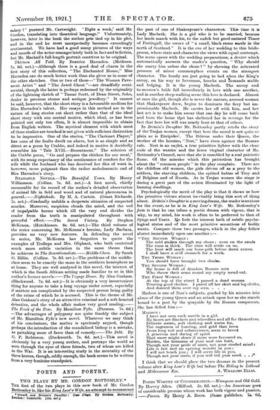POETS AND POETRY.
TWO PLAYS' BY MR. GORDON BOTTOMLEY.• THE first of the two plays in' this- new book of Mr. Gordon I3ottomle is, like his King Lear's- Wi e, an attempt to reconstruct Ohm* and Arnain4 Danghtar Tao Pia" rty Gordon nottentky. London: Constable. Ms. net.1 the past of one of Shakespeare's characters. This time it is Lady Macbeth. She is a girl who is to be married, because her lands march with• his, to the oafish but good-natured Thane of Fortingall, the owner of " a small, black stone castle in the north of Scotland." It is the eve of her wedding to this bride- groom, whose state and character she views with equal contempt. The scene opens with the wedding preparations; a device which automatically answers the reader's question, " Why should she marry him unless she chose ? " by showing the reiterated pressure of minor commonplace events on• the strongest character. The family are just going to bed when the King's envoy, on his way to Inverness, knocks and hemands *table and lodging. It is the young Macbeth. The envoy and to-morrow's bride fall immediately in love with one another, and in another sleep-walking scene this love is declared. Almost at once the girl, though she is never the mature, assured woman that Shakespeare drew, begins to dominate the fiery but im- pressionable Macbeth. He carries her off with him, and her last act is to make him swear that one day he will come back and burn the home that has sheltered her in revenge for the fact that here her will was nearly bent to that of others.
In Britain's Daughter Mr. Bottomley partly retells the story of the Trojan women, except that hero the moral is not-quite so plain as is Euripides'. The Britons under their Queen, the mother of the heroine, " Nest," have risen against the Roman rule. Nest is an eaglet, a true primitive fighter with the clear code of the warrior and the fierce virginal character of Mr. Bottomley's Gimeril, save that she is ennobled by areal patriotic flame. Of the miseries which this patriotism has brought about the " common people•" in the play complain. There are the childless old women, the girls driven off as a prey to• the soldiers, the starving children, the spitted babies of Troy and of Belgium• and of Russia. As in Trojan• women the stage is during a great part of the action illuminated by the light of burning dwellings.
Psychologically the merit of the play is that it shows us how the primitive virtues almost inevitably bring this sort of thing about. Britain's Daughter is a moving drama, the reader is anxious for the event, as' he in King Lear's Wife. Mr. Bottermley's forte is that he can infuse a poetic drama with vigour,. that is why, to my mind, his work is often to be preferred to that of Synge and Yeats. ble feels the interest both of subtle psycho- logical states and of the most primitive sensations of bodily wants. Compare these two passages, which in the play follow almost immediately upon one another :— " Tax SECOND WOMAN :
The cold strikes through my shoes ; even on the sands The rime is thick. The rime will settle on us, The frost will reach our bone-pith before dawn comes. I shall have a. stiff stomach for a week.
THE THIRD WOMAN :
You should have brought two cloaks.
Tan SECOND Woman :
My house is full of drunken Roman men Who throw their arms round my empty mead-vat.
THE FIRST WOMAN : At the top of the street I passed a dead- woman Wearing good clothes. I pared off her skirt and leg-cloths, And donned them over my own. . . .
Madron is one of Nest's subjects, goaded by his miseries into abuse of the young Queen and an attack upon her as she stands bound to a post by the quayside by the Roman conquerors. She has defied him :— MADRON :
I have not seen such mettle in a girl. My lasses are flinchers and wheedlers and all for themselves. Delicate meats, soft clothing and warm fur, The eagerness of hunting, and gold that frees From long toil and subservience, seem to breed A generous and daring of spirit That more• might share if more were favoured so. Maiden, the keenness of your soul can hurt, Though not your pride of state, not your steeled mind: Life is fair and an opening wonder in you :
I will not touch you ; I will serve life in you,
Though not your state, if you will tell your need. . . P
I think that we should gaze the two dramas in the present volume after King Lear's Wife but before The Riding to Lithend






































 Previous page
Previous page